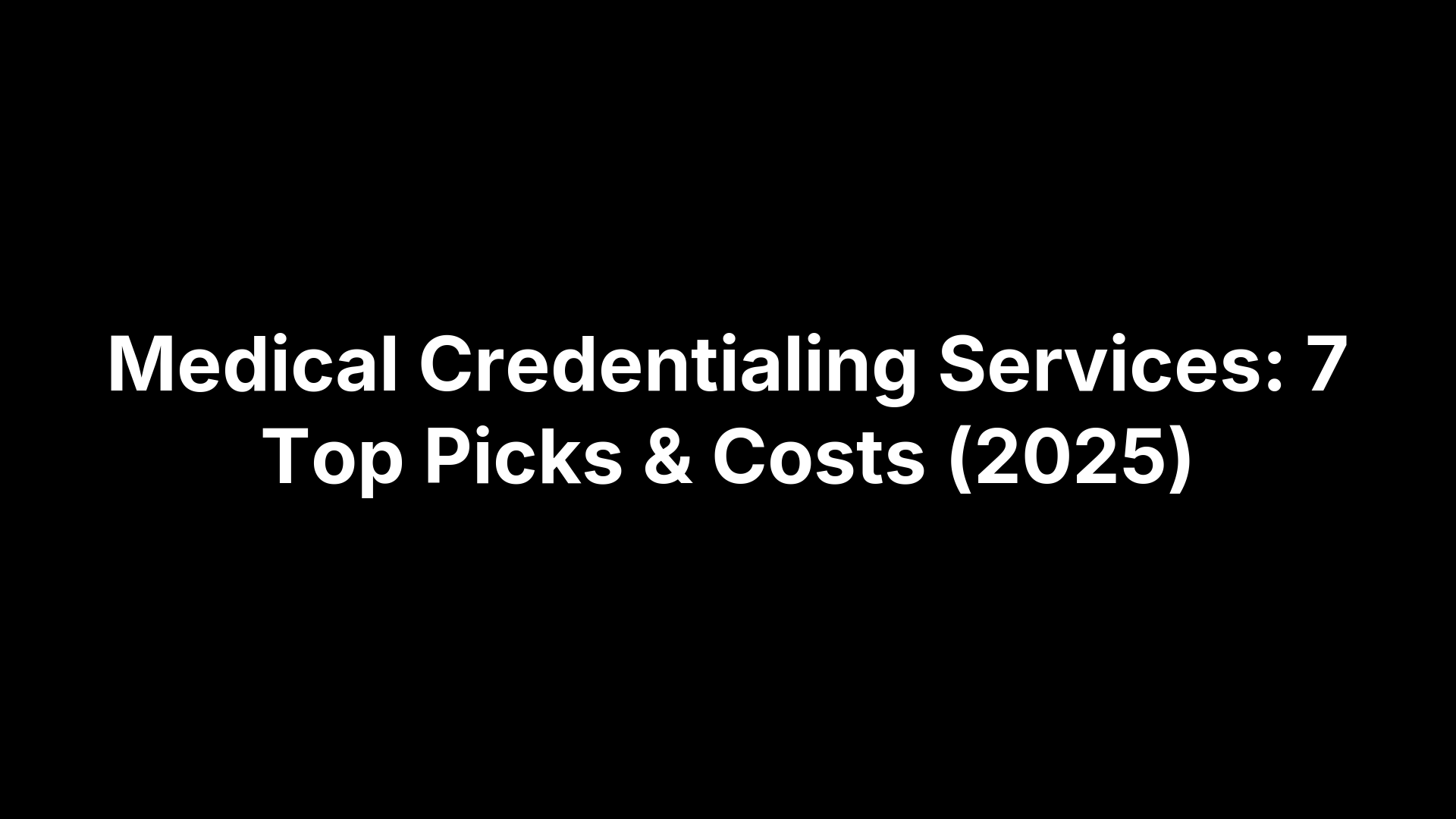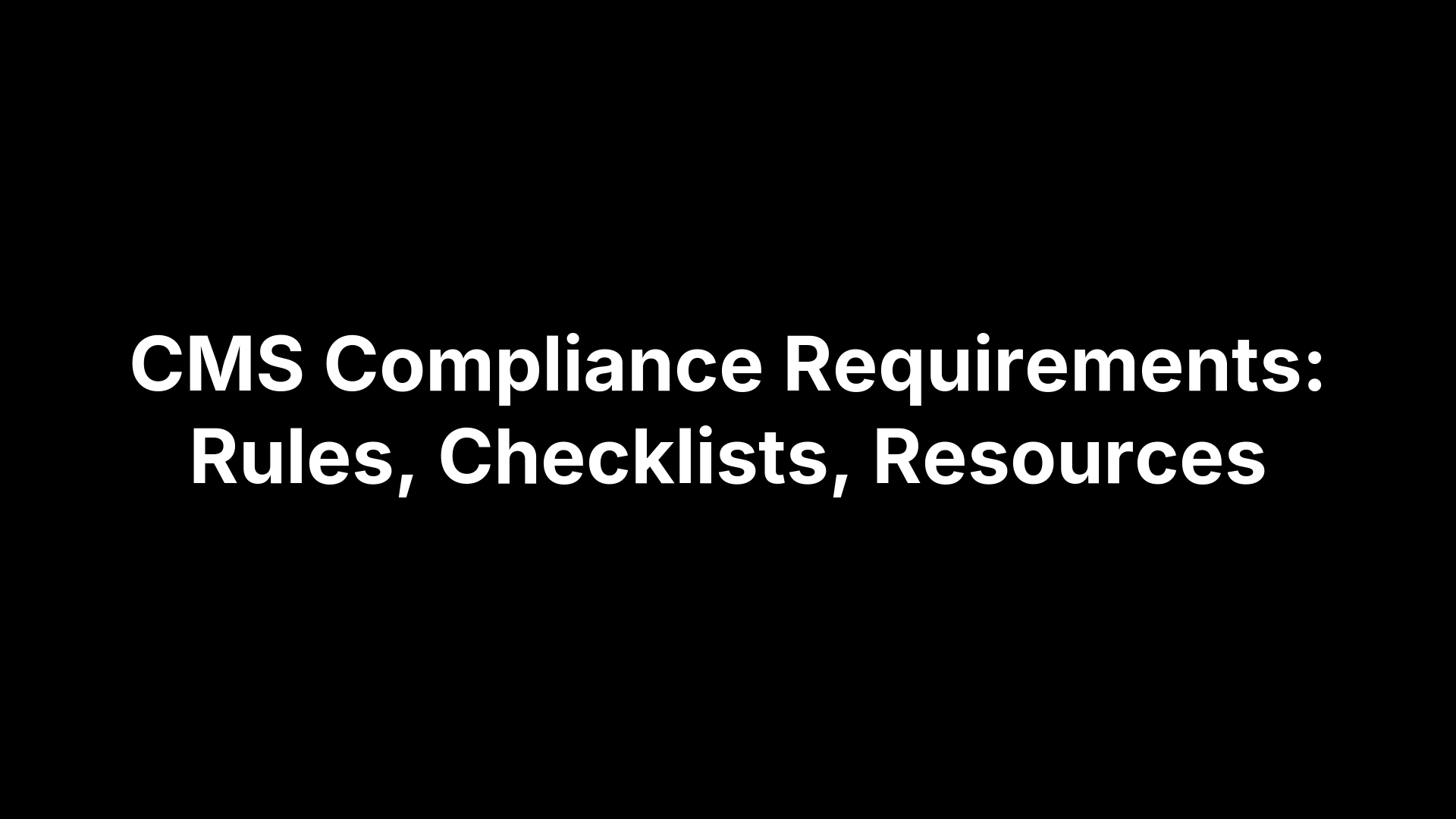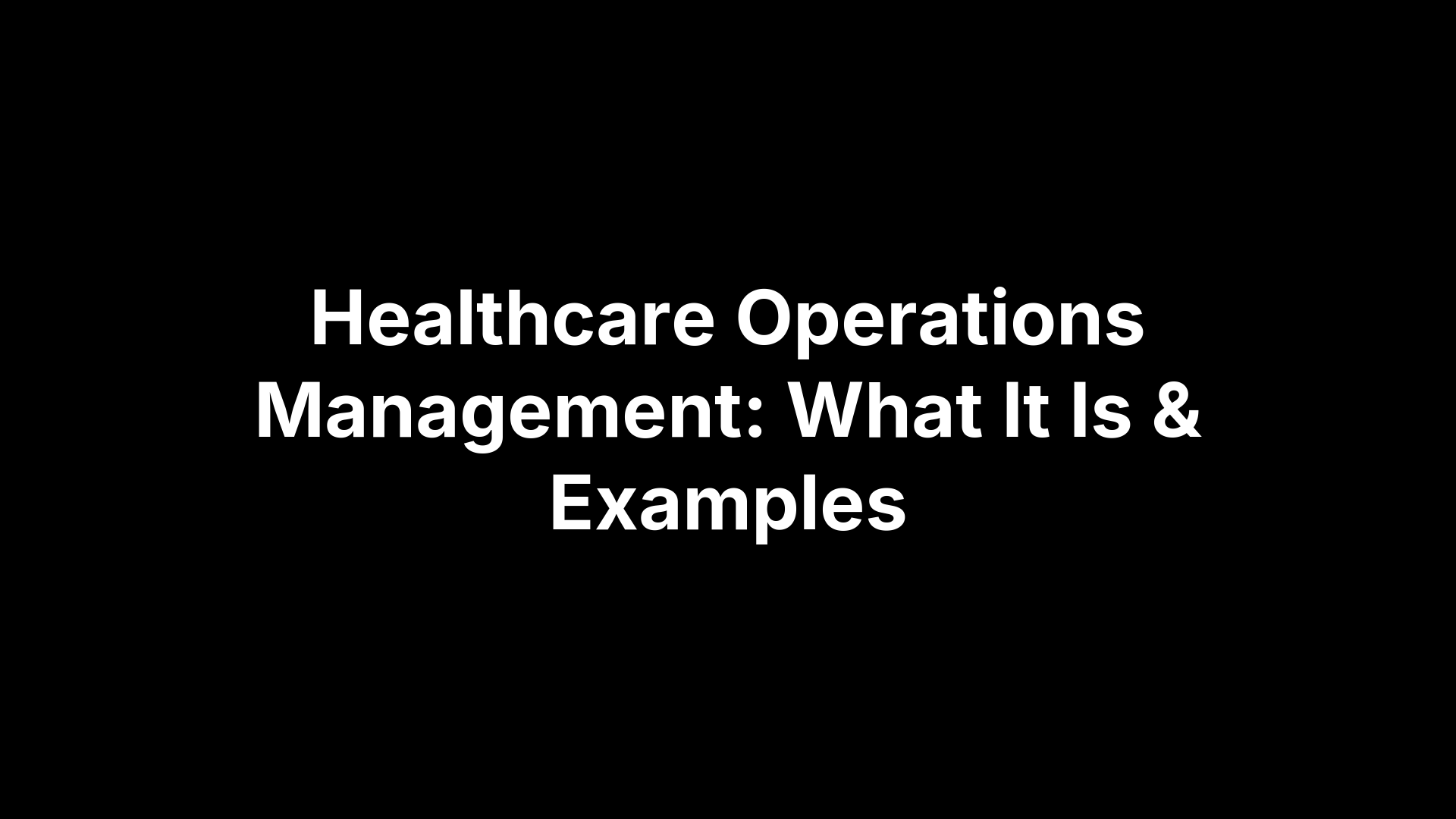Medical Credentialing Services: 7 Top Picks & Costs (2025)


Medical Credentialing Services: 7 Top Picks & Costs (2025)
If you’re stuck chasing CAQH attestations, PECOS updates, payer portal logins, and primary source verifications while clinicians wait to see their first in-network patient, you’re not alone. Medical credentialing is the gate to revenue, yet it’s slow, fragmented, and error-prone—especially when recredentialing cycles, hospital privileging, and multi-state enrollments stack up. Every week of delay can mean missed revenue, frustrated staff, and patients left in limbo. Outsourcing can help, but the market ranges from credentialing-only boutiques to enterprise CVOs, RCM suites tied to EHRs, and platforms that pair vendor credentialing with patient logistics—each with different costs, timelines, and contract terms.
This guide highlights seven top medical credentialing services for 2025, covering who each option is best for, core features, pricing ranges (per-application, per-provider annual, and project-based), and contract notes like minimums, setup fees, SLAs, and typical enrollment timelines. Whether you’re a small practice needing fast payer enrollment, a health system requiring enterprise-grade verification and monitoring, or an operations team seeking credentialing alongside dispatch, transport, and vendor management, you’ll find a match here. Below, we compare the standouts so you can pick a partner that speeds time-to-revenue and reduces administrative burden without sacrificing compliance or visibility.
1. VectorCare (Trust): best for health systems that need vendor credentialing alongside patient logistics
VectorCare is a unified patient logistics platform with a built-in vendor credentialing layer called Trust. Instead of treating credentialing as a standalone task, VectorCare ties onboarding, compliance, scheduling, dispatch, messaging, invoicing, and analytics into one workflow—cutting phone calls and manual rework while keeping vendors compliant for NEMT, EMS, home health, DME delivery, and more.
What it is
Trust is VectorCare’s vendor network management module for onboarding and credentialing contracted partners, enforcing policies, and keeping provider records current. Because it sits next to Hub (workflows), Pay (payments), Insights (dashboards), ADI (automated dispatching intelligence), and Connect (integrations), credentialing data actually drives daily operations—blocking non-compliant vendors from jobs and surfacing expirations before they disrupt care.
Core features
If you need medical credentialing services that operate inside your logistics workflow, Trust centralizes documents, verification steps, and controls—then automates what happens next.
- Centralized onboarding workflows: Collect required documents, policy attestations, and e-signatures (including PCS forms) via configurable Hub workflows.
- Credential management: Store and manage licenses, insurance, certifications, and affiliations for contracted vendors across service lines.
- Policy enforcement: Gate scheduling/dispatch based on compliance status so only eligible vendors receive assignments.
- Expiration monitoring and alerts: Automatic notifications to vendors and coordinators for upcoming renewals to prevent service gaps.
- Real-time coordination: Secure messaging keeps care teams and vendors aligned without back-and-forth calls.
- Automated dispatching intelligence (ADI): AI agents assist with scheduling, price negotiation, resource management, and billing.
- Payments and invoicing (Pay): Custom invoicing with ACH/credit card options and automated notifications.
- Analytics (Insights): Dashboards for performance, compliance, and resource planning.
- Integrations (Connect): Tie into EHR, CAD, and billing systems to unify credentialing with daily operations.
Who it's best for
Health systems, payers, public health departments, and EMS/fire agencies that manage a mixed network of transport, home health, and DME vendors across regions—and want credentialing directly linked to scheduling, dispatch, and payment. If your priority is fewer handoffs and faster time-to-revenue, VectorCare’s end-to-end model fits.
Pricing and contract notes
Pricing is quote-based and depends on scope (modules, integrations, vendor volumes). Unlike per-application credentialing vendors, VectorCare is a platform investment that replaces multiple tools and broker layers; customers commonly pursue total cost of ownership gains from automation, with reported results like up to 90% reduction in scheduling time and savings exceeding $500,000 annually for large hospitals. Expect implementation and integration planning as part of the engagement; request a tailored proposal to align costs with operational goals.
2. CureMD: best for practices that want credentialing integrated with EHR and billing
CureMD is an award‑winning health information systems provider that pairs EHR and billing with turnkey medical credentialing services. With experience serving tens of thousands of practices, CureMD focuses on speeding payer enrollment while maintaining accuracy and transparency—so new providers can start billing in-network sooner.
What it is
A credentialing and payer enrollment service delivered by CureMD’s health IT team. Instead of handing off paperwork across multiple vendors, practices can keep credentialing adjacent to their EHR and revenue cycle, helping reduce bottlenecks from first application through re-credentialing.
Core features
CureMD’s credentialing solution emphasizes speed, accuracy, and visibility across the enrollment lifecycle.
- Government and commercial enrollment: Medicare/Medicaid and major commercial payers.
- Essential registrations: NPI registration plus CAQH and PECOS profile creation and updates.
- License and certification management: Ongoing maintenance of licenses, certifications, and affiliations.
- Re-credentialing support: Continued assistance through renewal cycles.
- Time-to-live improvements: CureMD reports reductions from months to weeks, depending on payer response and completeness.
Who it's best for
Practices that want credentialing tightly connected to EHR and billing operations—especially small to midsize groups onboarding providers frequently, new practice start-ups aiming for a streamlined launch, and multispecialty clinics expanding payer coverage without adding administrative load.
Pricing and contract notes
Pricing is quote-based through CureMD’s sales team. Scope typically varies by number of providers, targeted payers, and any ancillary support (e.g., ongoing re-credentialing and profile maintenance). Timelines are payer-dependent; closed panels and incomplete documentation can extend processing. Ask about SLAs, status reporting cadence, and inclusions like CAQH attestation reminders and PECOS updates before you sign.
3. Physician Practice Specialists (PPS): best credentialing-only partner for small to midsize groups
Physician Practice Specialists is a US‑based consultancy that focuses on medical credentialing services, payer contracting, and practice start‑up support. Operating nationwide since 2008, PPS positions itself as a credentialing‑first partner with an A+ reputation and a track record that includes 5,000+ providers credentialed and 1,000+ practices launched—ideal for groups that want hands‑on execution without buying an EHR or RCM stack.
What it is
A credentialing‑only partner that manages payer enrollment end‑to‑end and offers complementary services like hospital enrollment/privileging, medical licensing, CAQH management, re‑credentialing, and contract negotiation. PPS also provides software-enabled application completion, submission, and tracking so administrators can monitor progress without chasing emails.
Core features
PPS emphasizes accuracy, transparency, and speed, packaging credentialing tasks into clear, a la carte deliverables.
- Payer enrollment (government and commercial): Medicare/Medicaid plus major commercial plans.
- Profile creation and upkeep: CAQH management and ongoing attestations; PECOS and NPI support.
- Hospital enrollment and privileging: Coordination with medical staff offices for timely approvals.
- Medical licensing assistance: New licenses and renewals, including multi‑state workflows.
- Re‑credentialing and maintenance: Calendarized renewals to avoid lapsed status.
- Contract negotiation support: Fee schedule reviews and payer contracting guidance.
- Application tracking: Software-driven completion, submission, and status visibility.
- US‑based support: Dedicated specialists for small to midsize group needs.
Who it's best for
Small to midsize practices and behavioral health groups that need a credentialing‑only partner, multi‑provider start‑ups aiming for fast payer access, and clinics that prefer a transparent, a la carte scope rather than bundling with EHR/RCM. Also a fit for groups expanding to new states without internal credentialing FTEs.
Pricing and contract notes
PPS does not publish pricing; engagements are quote‑based by provider count, payer mix, and scope (e.g., hospital enrollment, licensing, ongoing maintenance). Industry ranges for medical credentialing services typically run ~$200–$500 per application or ~$1,000–$3,000 per provider annually for ongoing management. Confirm inclusions (CAQH re‑attestations, license renewals, re‑credentialing), status reporting cadence, SLAs, and any minimums or setup fees before signing.
4. National Credentialing Solutions (NCS): best for fast payer enrollment and recredentialing services
National Credentialing Solutions positions itself as a provider enrollment expert. Their focus is straightforward: process credentialing applications for healthcare providers so they can bill health plans and receive in‑network reimbursement. If you need a credentialing partner without bundling EHR or RCM, NCS offers a dedicated path to payer participation.
What it is
NCS is a credentialing services firm that handles the preparation and processing of payer applications for providers and groups. By concentrating on provider enrollment and renewals, they help organizations move from “pending” to “in‑network” and maintain status across renewal cycles.
Core features
NCS emphasizes practical execution over add‑ons, centered on getting applications submitted correctly and moving through review.
- Application processing for payer enrollment: End‑to‑end handling of provider paperwork to join health plan networks.
- Recredentialing support: Management of renewals to keep providers active with existing payers.
- Payer coordination and follow‑up: Communication during reviews to resolve information requests and keep files advancing.
- Status visibility: Regular updates so administrators know where each application stands.
Who it's best for
Solo providers, small to midsize practices, and specialty groups that want a focused credentialing partner to accelerate in‑network approvals and keep renewals on schedule—without purchasing a broader software suite. Also a fit for organizations adding providers frequently and needing reliable throughput.
Pricing and contract notes
NCS does not publish pricing; engagements are quote‑based by scope (provider count, payer targets, renewals). As a benchmark, industry ranges for medical credentialing services often fall around ~$200–$500 per application or ~$1,000–$3,000 per provider annually for ongoing management. Timelines vary by payer responsiveness and documentation completeness. Ask about SLAs, update cadence, inclusions (first‑time enrollment vs. recredentialing), and any setup fees or minimums before signing.
5. Verisys: best for enterprise-grade primary source verification and ongoing monitoring (CVO)
When you need industrial-strength medical credentialing services that go beyond form-filling, Verisys delivers credentialing built on primary source verification and continuous monitoring. Their healthcare provider credentialing solutions span verification through ongoing oversight—designed for organizations that must prove compliance at scale.
What it is
Verisys operates as an outsourced credentialing verification organization (CVO) focused on accuracy and risk reduction. They handle provider verification end-to-end and extend the relationship with ongoing monitoring, so organizations maintain network integrity long after initial approval.
Core features
Verisys is geared for enterprises that need deep verification and sustained oversight across large rosters.
- Primary Source Verification (PSV): Validates provider credentials directly with issuing sources for a defensible file.
- Ongoing monitoring: Continuous checks to keep credentialing current over time, not just at initial enrollment.
- Comprehensive credentialing support: Services cover the credentialing lifecycle from verification to maintenance.
- Audit-ready documentation: Structured outputs that support internal reviews and external audits.
- Scalability for large networks: Built to support multi-entity, multi-specialty organizations with complex needs.
Who it's best for
Health systems, payers, public sector agencies, and large multi-site or multi-specialty groups that require enterprise-grade PSV and continuous monitoring. If your risk posture demands verifiable, repeatable processes and clear documentation, Verisys fits.
Pricing and contract notes
Verisys pricing is quote-based and reflects scope (provider volumes, verification depth, monitoring cadence). For context, industry ranges for credentialing often land near ~$200–$500 per application or ~$1,000–$3,000 per provider annually for ongoing management, though enterprise CVO programs may price differently. Clarify SLAs, turnaround targets, monitoring frequency, data delivery format, and what’s included in initial vs. ongoing services before contracting.
6. PayrHealth: best for credentialing plus payer contract negotiation at scale
If your growth hinges on fast enrollments and stronger payer terms, PayrHealth brings medical credentialing services together with contract negotiation and revenue cycle support. The Austin-based firm focuses on payer relationship management at scale—aiming to move providers in-network faster while optimizing reimbursement.
What it is
PayrHealth is a credentialing and payer contracting partner founded in 1994 that handles enrollment (commercial and Medicare/Medicaid), licensing, privileging, and ongoing credentialing management, then extends into negotiation and revenue operations. The company cites 50,000+ negotiated contracts and approximately $23B in net patient revenue influenced.
Core features
Beyond completing applications, PayrHealth centers on throughput and payer performance.
- Payer enrollment: Government and commercial plan credentialing with application preparation, submission, and follow-up.
- Primary Source Verification and monitoring: Verification plus continued oversight to maintain compliant status.
- Credentialing management: Ongoing recredentialing, CAQH re-attestations, and documentation upkeep.
- Medical licensing and hospital privileging: New applications and renewals to support multi-state coverage.
- Contract negotiation: Fee schedule reviews and payer contracting to improve rates and terms.
- Volume execution: The company reports 100,000+ applications submitted and 20,000+ CAQH profiles re-attested annually.
Who it's best for
Multi-site groups, MSOs, PE-backed platforms, and specialty practices adding providers and states rapidly—especially those that want one partner to both credential at volume and negotiate payer contracts for better yield.
Pricing and contract notes
Pricing is quote-based by scope (provider count, payer list, licensing/privileging, and ongoing maintenance). As a benchmark, industry ranges for credentialing often run ~$200–$500 per application or ~$1,000–$3,000 per provider annually for management. PayrHealth claims time-to-revenue gains (e.g., saving 21 days and ~$94.5K in revenue). Confirm SLAs, update cadence, inclusions (recredentialing, CAQH, monitoring), and any minimums or setup fees before contracting.
7. Practolytics: best budget-friendly RCM with transparent credentialing support
Practolytics pairs revenue cycle management and practice management with medical credentialing services at competitive prices. Serving 28+ specialties and 1,400+ active providers, the team emphasizes clear communication and predictable progress—reducing back-and-forth so you can start billing sooner without bloating overhead.
What it is
A credentialing service embedded within a broader RCM offering. Practolytics handles payer enrollment while your billing and operations stay in sync, providing bi-monthly updates so administrators always know what’s done, what’s pending, and what’s needed next.
Core features
Practolytics focuses on practical execution and visibility that keeps enrollments moving while minimizing administrative strain.
- Government and commercial enrollment: Credentialing with Medicare, Medicaid, MCOs, and major commercial payers.
- Bi-monthly status reports: Regular progress updates that flag blockers early and set realistic go-live expectations.
- Direct payer communication: Coordinates with insurance representatives to resolve issues quickly and cut delays.
- RCM alignment: Ability to bundle credentialing with billing and practice management for operational efficiency.
- Multi-specialty scale: Experience across 28+ specialties and 1,400+ active providers.
Who it's best for
Cost-conscious solo to midsize practices, multispecialty groups, and startups that want credentialing tightly aligned with RCM—and value predictable, bi-monthly reporting without buying an enterprise CVO.
Pricing and contract notes
Pricing is quote-based and varies by provider count and payer mix. As a benchmark for medical credentialing services, expect around ~$200–$500 per application or ~$1,000–$3,000 per provider annually for ongoing management; bundled RCM may sharpen total cost. Confirm inclusions (first-time enrollment vs. renewals), reporting cadence, SLAs, and any setup fees or minimums before signing.
Next steps
Credentialing lags drain revenue and staff time, but you now have a clear shortlist aligned to different needs—EHR‑tied enrollment, credentialing‑only specialists, enterprise PSV/CVO, and platforms that bind compliance to daily operations. Lock in speed and visibility by turning this comparison into an action plan.
- Define your scope: Providers, payers, states, hospital privileging, licensing, and ongoing monitoring.
- Standardize data early: Validate CAQH, NPI, PECOS, licenses, insurance COIs, and affiliations before outreach.
- Set targets and SLAs: Time‑to‑submission, payer response follow‑ups, recredentialing cadence, and reporting frequency.
- Pilot, then scale: Start with 1–2 specialties or regions; expand after you confirm throughput and communication.
- Measure impact: Track days to first claim, denial rate, and staff hours saved to quantify ROI.
If you need credentialing woven into scheduling, dispatch, payments, and vendor control, unify the workflow instead of stitching tools together. Explore VectorCare to see how Trust links vendor credentialing with patient logistics so compliant partners get the right jobs—and revenue flows sooner.
The Future of Patient Logistics
Exploring the future of all things related to patient logistics, technology and how AI is going to re-shape the way we deliver care.



